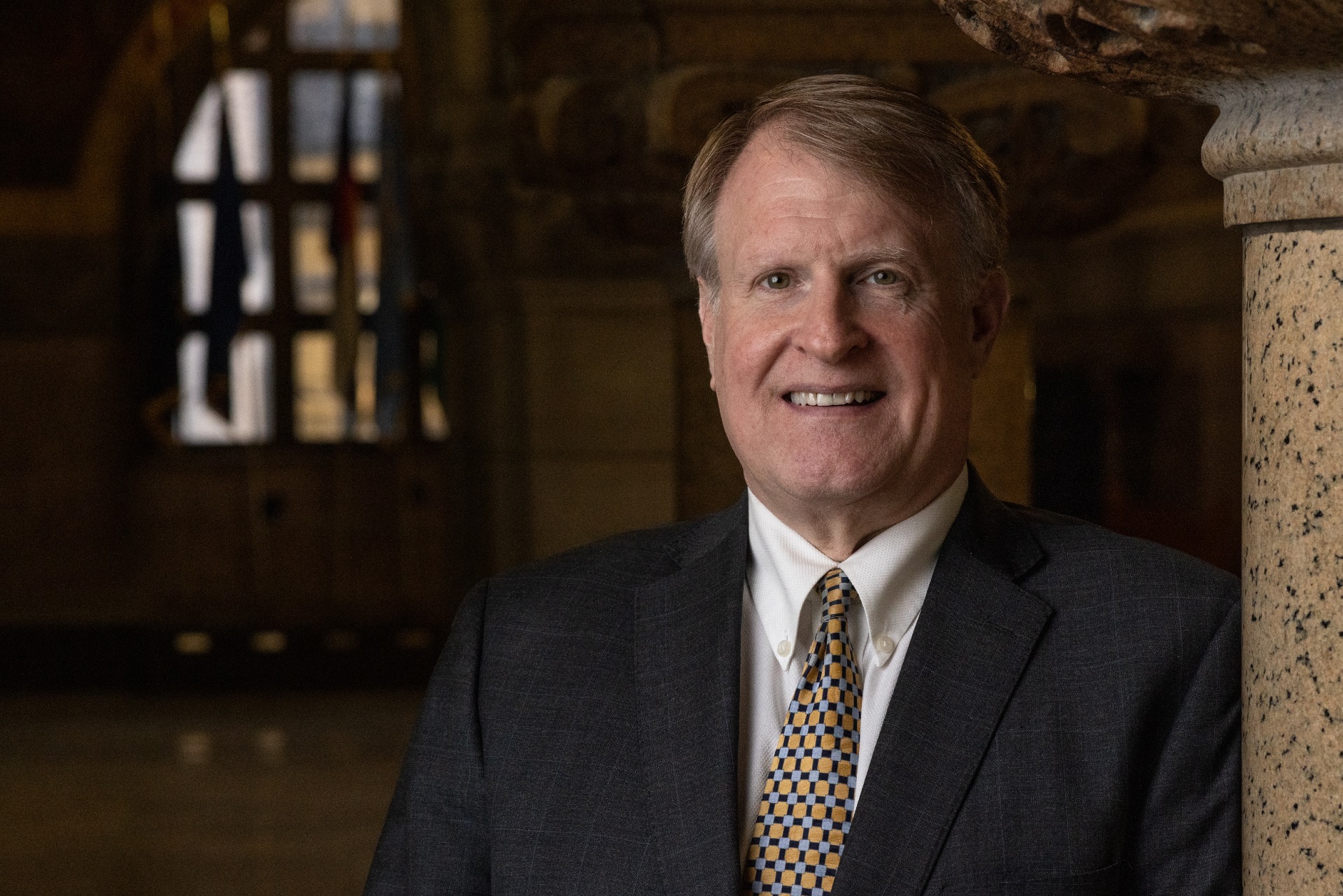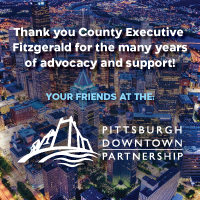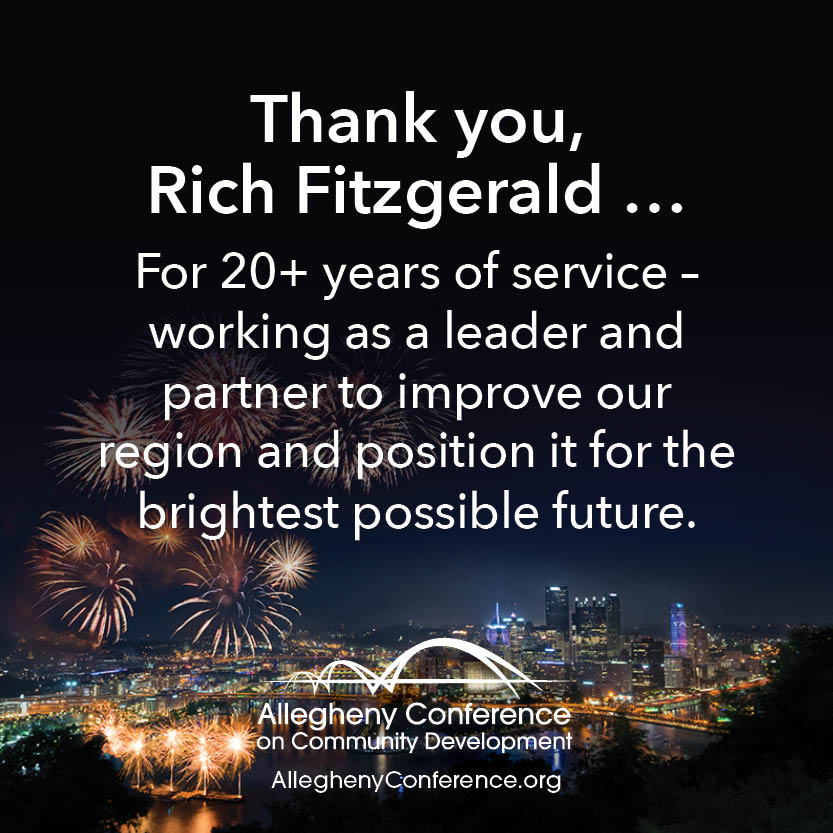How Rich Fitzgerald's Collaborative Leadership Created a Thriving Tech Ecosystem
By Jonathan Kersting
 After nearly 24 years serving Allegheny County as a Councilman and Executive, Rich Fitzgerald leaves behind a legacy of transformative accomplishments. Throughout his tenure, Fitzgerald has demonstrated unwavering dedication to the residents of Allegheny County, striving to improve the quality of life for all. With a focus on economic growth, public safety, and community development, Fitzgerald has successfully implemented initiatives that have left a lasting impact on the county and created a foundation for a growing tech and innovation ecosystem. From spearheading job creation efforts to championing inclusive urban development, his leadership has paved the way for a more prosperous and thriving Allegheny County.
After nearly 24 years serving Allegheny County as a Councilman and Executive, Rich Fitzgerald leaves behind a legacy of transformative accomplishments. Throughout his tenure, Fitzgerald has demonstrated unwavering dedication to the residents of Allegheny County, striving to improve the quality of life for all. With a focus on economic growth, public safety, and community development, Fitzgerald has successfully implemented initiatives that have left a lasting impact on the county and created a foundation for a growing tech and innovation ecosystem. From spearheading job creation efforts to championing inclusive urban development, his leadership has paved the way for a more prosperous and thriving Allegheny County.
TEQ’s Jonathan Kersting wanted to take a closer look at some of the key achievements and milestones achieved under his watch. Here’s what Fitzgerald had to say:
Jonathan Kersting: Thanks for taking the time to talk to me. I know you're super busy, but at the Tech Council, we've seen the work that you've done over the years. And it's done so much to make us a destination for tech companies to come here to expand and help people build a real quality of life. What are some of your administration’s key accomplishments?
Rich Fitzgerald: Well, of all the things that I've worked on, whether it was with the transit system, the airport, the trails, bridges, roads, all of it was about creating an economic climate that would keep our young people and attract young people to come here. And that's the thing I'm probably most proud of - the fact that we've grown the young adult population in the last census, and there is a much more diverse population than when I grew up here. And now people come here from Asia, from South America, from all over Africa, from all over the globe.
 |
 |
 |
The first county executive Jim Roddey used to tell a story about Pittsburgh, and he'd say, “Two guys were sitting on a park bench. And one said to the other, ‘What would you do if a meteor was going to hit the Earth, and the world was going to end?’ and his buddy says, ‘I'd move to Pittsburgh because it takes things five years longer to get to Pittsburgh than any other place.’” Twenty-five years ago, there was a lot of truth to that to that story and that joke, but 25 years later, it is just the opposite. I feel like we're five years ahead of everybody. With robotics, autonomous vehicles, I mean, it's all the groundbreaking futuristic jobs that are growing. So, the collaboration that I've been able to have with the Tech Council has been so important to the growth of that 20% growth of young population over that 10-year period. And it continues to happen. You see it in Lawrenceville, East Liberty, the Strip District and the North Shore, etcetera, etcetera, where there's this beehive of young people that are just discovering Pittsburgh and Allegheny County for the first time. And it's exciting.
JK: One of the things that I think I've most admired about you over the years is your ability to work with everybody in this day and age where everything is so freakin’ polarized. You work with everybody. I've never seen you not welcome somebody. It's always been, “Let's get everybody in the room to figure out these problems because these problems impact everybody.” Where did you learn that?
RF: I guess I learned that in business, 30 years of business before I became County Executive. You’ve got to work with your customers, right? You’ve got to work with the stakeholders, you’ve got to work with your suppliers, you've got to work with all because if any part of the chain -- you know, the old saying is only as strong as its weakest link -- breaks, it doesn't work. So, you know, first of all, you need government at all levels, federal, state, local level, coming together in a community. You need the corporate community, you need organizations like the Tech Council to be supportive of an initiative or a development that might occur in a new neighborhood like in East liberty or Lawrenceville. Whatever it might be, you need to get the universities on board, you need to have that collaboration. So, you do need to get collaborative to move together. And I think it's one thing that Pittsburghers are really good at. It was easy to do. Because we kind of have this mindset that I think we've had going back to when the industrial collapse occurred in the '80s. We were forced to work together to succeed. And it's been a model.
JK: And I'm just curious, because it seems like Allegheny County has been this interesting ecosystem where we have old school industry and labor that's still very strong alongside the new tech that's coming in. Sometimes there's some sparks there, and there's some friction. But I feel like we've been able to navigate that and get these worlds to come together on the main issues where people are realizing how important it is to have people in the trades now and how those are key to robotics and autonomy companies.
RF: You’re right. And what I've seen, say with the building trades, I think of the electricians and the steamfitters. They all have training facilities and when you go there, and you really look at what they're doing. They're looking at the next technology, right, including technologies that would probably reduce man hours, but they've got to do it. Whether you're a plumber, putting things together the old-fashioned way that takes four hours when the “new-fashioned” way with a new machine might take a half an hour. Obviously, it's going to cut but they realize that they've got to compete, and they've got to be proactive.
You’ve got to work with your customers, right? You’ve got to work with the stakeholders, you’ve got to work with your suppliers, you've got to work with all because if any part of the chain -- you know, the old saying is only as strong as its weakest link -- breaks, it doesn't work. So, you know, first of all, you need government at all levels, federal, state, local level, coming together in a community. You need the corporate community, you need organizations like the Tech Council to be supportive of an initiative or a development that might occur in a new neighborhood...
You even see what I'll consider are older companies like the PPGs and PNCs. They've been around for 100 years, but they are embracing the new technologies. PPG is part of the autonomous/electric vehicle world, so that's a brand new world that they would have never known about 20-30 years ago. But they're embracing it. In addition, obviously, you've got the Googles and the Apples…these are kind of newer companies that are more emerging. So, there is a blend, and some of that will create some of the friction that I think is generational. Yeah, 25 year olds think a lot different than 55 year olds. And they have different ideas.
JK: So I think for anyone that's in a leadership position, over the past decade, obviously, every day is just fraught with challenges large and small. But COVID was on a whole other level. I remember having you and many elected officials on our daily “Business as Usual” webcast. We'd have 150 people show up for the latest updates and a little hope. And that was just so important to see the leadership coming from the county.
RF: Before COVID, I was not a person that called a lot of press conferences because I truly believe people, at some point, get fatigued. But during COVID, we knew we had to do it. So every morning, I did a five or 10 minute segment on KDKA just reporting how many cases how many people were hospitalized. Were there enough beds? Did we have enough vaccine? And then every Wednesday, we would do a live stream video with Dr. Deb Bogen, and myself answering questions from the media. So for every Wednesday for almost two solid years, at four o'clock, we would look into the into the camera, provide an update, and Deb would, again, reassure people, it's going to be okay, if you do these things. We had to obviously take the precautions that you needed to do. But those things were important, and the fact that not only did I come in every day, but so did the county manager, my chief of staff and the communications director. All of our people came in and it set an example that, definitely you can do it, you can come in and get the work done.
JK: You’re giving me flashbacks! Okay, let's talk about your commitment to working with the parks and outdoor amenities. You’ve been relentless on trying to improve our quality of life by getting people outdoors.
RF: Well, again, I think young people who have choices are going to move and live in places that have a good quality of life. And I talked about the pride I've had in growing this economy with jobs and keeping young people and all that kind of stuff. I'm equally as proud of the fact that while we did that, we reduced air pollution by 80%. From the time I took office to what it is now, from 2012 to 2023, there has been an 80% reduction in air pollution. And for the first time, every air quality monitor in Allegheny County is in compliance and has been for three years in a row. And it's going to make it this year for the fourth year in a row.
We've improved the parks, we've improved the infrastructure, we improved the airport, improved air quality, the environment, the water, quality of our rivers, you know, all those types of things. It’s a better place to live. And again, I'll say one other thing. In the 12 years, I've been County Executive, we haven't raised taxes. The cost of county government hasn't gone up in 12 years. But we invested in parks, we invested in jobs, job training and more. So, we did it very efficiently.
We grew an economy and reduced air pollution, two very conflicting things. The rivers are cleaner than they've ever been. Our airport is the only airport in the world that produces its own energy. A hydro plant is being built to use the Emsworth Lock and Dam to produce energy. We've invested in sustainability and quality of life. I think this next generation that's coming up is more environmentally conscious, certainly around climate change. The fact that we are leading the way in doing that is important.
JK: What's our biggest opportunity as we move forward as a region?
RF: I think we continue to lean into the things that we're successful at like the next generation of robotics, AI and life sciences, and the things that we're starting to see coming out of our universities, the futuristic collaborative efforts and economies. And I put sustainability and climate change right at the top of that list. This is a $20 trillion worldwide market as industry after industry after industry tries to decarbonize. And the fact that we've got the brainpower, the infrastructure, and trained workforce with our labor unions that can do these type of things, puts us in a really good position. I think a couple of things we've learned over the years is diversification of our industries. When we were a one industry town, and that industry collapsed, we were devastated. We were literally flat on our back, and I think of a 19-20% unemployment rate in this region back then. It’s now 3% because we do so many things. It's energy, finance, robotics, the things I've been talking about, we do so many different things.
JK: So how would you like people to remember your service?
RF: That I helped turn this place around. Pittsburgh was a place where my parents were almost resigned to the fact that when their kids grew up, they were going leave when they got out of school. And now they can stay. So that is the thing, that we've made this place better. We've improved the parks, we've improved the infrastructure, we improved the airport, improved air quality, the environment, the water, quality of our rivers, you know, all those types of things. It’s a better place to live. And again, I'll say one other thing. In the 12 years, I've been County Executive, we haven't raised taxes. The cost of county government hasn't gone up in 12 years. But we invested in parks, we invested in jobs, job training and more. So, we did it very efficiently. We did it without raising taxes on people's homes, which is their bedrock of where they invest.
JK: I figure you’ve got to be a man who's in demand. I know you can't tell us what you’ll be doing next, but can you give us a little hint?
RF: I’ve had 12 years as County Executive and I've loved it, I really have. I do want to stay involved in working with workforce, economic development, infrastructure, things that I care about. The other thing is even though I grew up in the City of Pittsburgh, I'm not someone who’s just about the city, or even just about the county. I mean, I supported the cracker plant, which is in Beaver County. I've supported some of our companies down in Southpointe, which is in Washington County. I mean, obviously, the Pittsburgh International Airport is a regional infrastructure facility that we work on. And so, you know, I care about this region, this is where I grew up. And even when I was in business, you know, I covered western Pennsylvania. I spent time in these in these communities outside of just Pittsburgh.
This is what I care about. And this is where my family lives. My kids, I've got six of my eight kids in the city working doing things on their own. I have a grandchild on the way. I’m very excited about that. So, for (my wife) Cathy and I, this is our home. And, you know, I want to do something to continue. I'm still young enough, I got something to contribute and I'm not ready to put my feet up just yet.
JK: We don't want you to do that. But I want you to put your feet up on a Tuesday night. Okay?
RF: I'll probably get to go to more ballgames, more shows or movies. Yeah, that kind of sounds great.